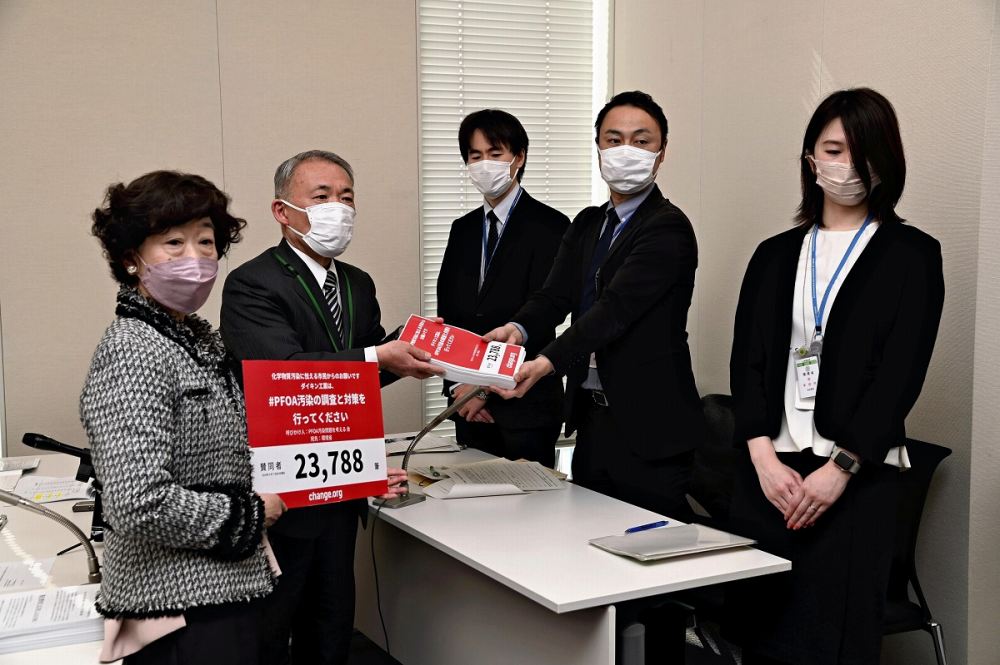
Members of a citizens group from Settsu, Osaka Prefecture, submit a petition to officials in charge at the Environment Ministry in Chiyoda Ward, Tokyo, on March 8.
17:16 JST, April 30, 2023
PFAS, a group of chemical substances that are feared to be carcinogenic, have been detected in high levels in rivers and groundwater throughout Japan.
With many unknown points about PFAS and the potential effects on health due to exposure, the government has yet to take sufficient measures to deal with the problem.
PFAS stands for per- and polyfluoroalkyl substances. These repel water and oil, are heat-resistant, and have been widely used for such purposes as nonstick frying pan coatings, water-repellent sprays and foam fire extinguishing agents.
On March 8, members of a citizens group in Settsu, Osaka Prefecture, submitted a petition of 23,788 signatures to the Environment Ministry, demanding an investigation into PFOA (perfluorooctanoic acid), a type of PFAS, in their community.
The city is home to a plant of Daikin Industries, Ltd., a leading air-conditioning equipment maker, which had been using PFOA in the manufacturing process of automobile parts and other products since the 1960s. The company stopped using PFOA in 2012, after the U.S. Environmental Protection Agency demanded that the company and others with bases in the United States stop using the substance.
Since then, Daikin has pumped up groundwater from the surrounding area and removed PFOA from it with the use of activated carbon. But the levels of the substance remain high.
When the ministry surveyed the groundwater in the city at a location near the plant in fiscal 2020, 5,500 nanograms of PFOA per liter of water was found, a level 110 times higher than the 50 nanograms per liter of water specified as a provisional standard by the central government.
Two years later, a survey taken by the prefectural government found 6,500 nanograms of PFOA per liter of water in a nearby irrigation channel.
The prefectural government has urged people not to drink groundwater, but people’s concerns persist.
“I’m also concerned about the potential effects on children,” said a member of the citizens group. “I hope the government will take responsibility and supervise the relevant entities.”
Residents taking blood tests
The harmful effects of PFAS began to draw attention in the 2000s. The U.S. Centers for Disease Control and Prevention (CDC) pointed out that the higher the amount in the blood, the higher the risk of developing kidney or testicular cancer.
The U.N.’s Stockholm Convention on Persistent Organic Pollutants prohibited in principle the manufacture and use of PFOA and PFOS (perfluorooctane sulfonic acid), two types of PFAS, by 2019. The Japanese government also decided to ban all domestic production and import of PFOA and PFOS by 2021.
In 2020, the Environment Ministry set a provisional standard of 50 nanograms combined of PFOA and PFOS per liter of water, a level that is said to not cause any adverse health effects even if two liters of water containing those amounts of the substances were drunk on a daily basis.
In a survey conducted in fiscal 2021, out of 1,133 locations in the country, amounts of chemical substances above the tentatively specified standard were found in 81 locations in Tokyo and 12 other prefectures.
The guidebook drawn up by the ministry only states, “Investigations will be conducted to identify the source generating the substances and necessary measures will be considered to reduce concentrations.” Without specific measures, however, local governments are at a loss as to how to respond.
The Kanagawa prefectural government continues to conduct its inspections at the points where the levels exceed the standard, but there is no factory nearby that could be the source generating the chemical substances.
“We have no idea what we should do, nor how much,” said an official at the prefecture’s water quality section.
The initiative to take blood tests for PFAS is spreading among residents living in places where high levels of the substances were found in water, including the Tama area of western Tokyo and Ginowan, Okinawa Prefecture.
In response to this situation, the ministry in January established a panel of experts comprised of those in chemical substances and public health to discuss revisions to the guidebook and measures to be taken.
Stricter regulations overseas
Scientific knowledge of the potential adverse health effects of PFAS is insufficient even in foreign countries.
“It is not easy to find fundamental solutions,” said a senior Environment Ministry official.
Nevertheless, countries around the world are successively tightening the standards for PFAS in drinking water.
Last September, the World Health Organization published a tentative proposal to set the standard for PFOS and PFOA at 100 nanograms per liter of drinking water, while calling on countries to achieve as low a level of the substances in water as possible.
The European Union calls on its member nations to set stricter standards than the ones set by the WHO, and Germany intends to set the standard per liter of water at 20 nanograms combined for four kinds of PFAS by 2028.
In March this year, the U.S. Environmental Protection Agency announced a proposal to tighten the standards for PFOS and PFOA to 4 nanograms each. A final decision on the matter will be made by the end of this year.
“Compared to Western nations where regulations are being tightened, the Japanese government’s moves have been slow,” said Koji Harada, an associate professor at Kyoto University and a scholar on environmental health. “The government should conduct not only surveys on water quality but also blood tests of residents and soil surveys proactively, to clarify the overall picture of contamination.”
Top Articles in Society
-

Producer Behind Pop Group XG Arrested for Cocaine Possession
-

Man Infected with Measles Reportedly Dined at Restaurant in Tokyo Station
-

Man Infected with Measles May Have Come in Contact with Many People in Tokyo, Went to Store, Restaurant Around When Symptoms Emerged
-

Woman with Measles Visited Hospital in Tokyo Multiple Times Before Being Diagnosed with Disease
-

Australian Woman Dies After Mishap on Ski Lift in Nagano Prefecture
JN ACCESS RANKING
-

Producer Behind Pop Group XG Arrested for Cocaine Possession
-

Japan PM Takaichi’s Cabinet Resigns en Masse
-

Man Infected with Measles Reportedly Dined at Restaurant in Tokyo Station
-

Israeli Ambassador to Japan Speaks about Japan’s Role in the Reconstruction of Gaza
-

Videos Plagiarized, Reposted with False Subtitles Claiming ‘Ryukyu Belongs to China’; Anti-China False Information Also Posted in Japan






















